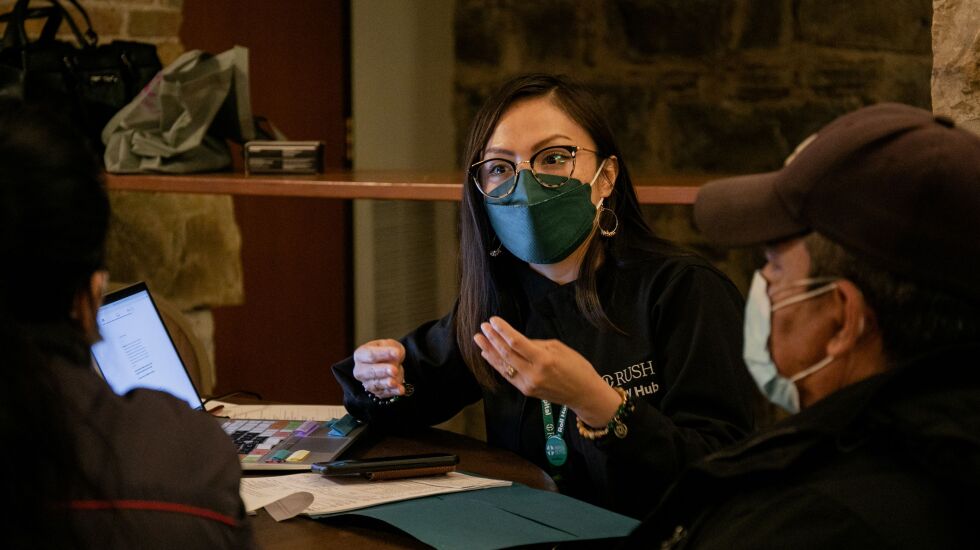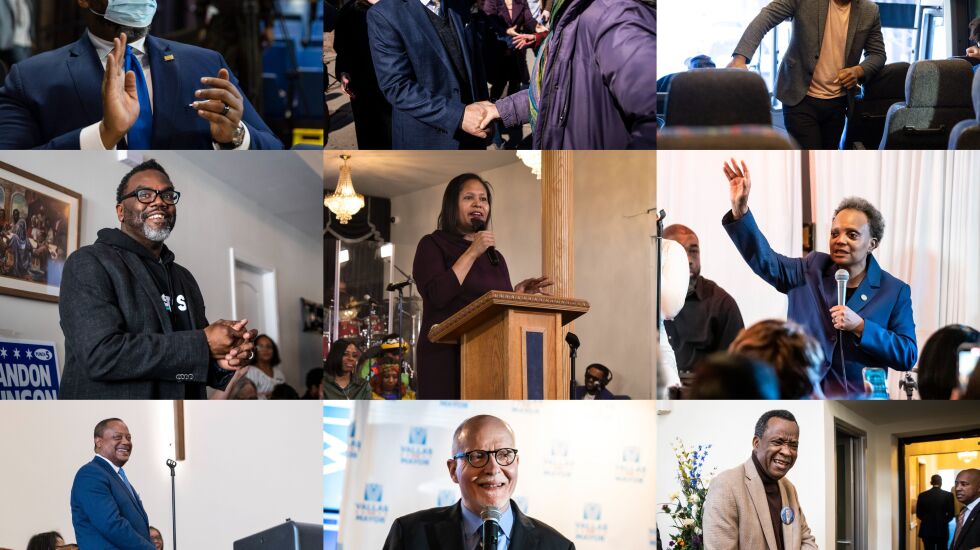
Good afternoon. Here’s the latest news you need to know in Chicago. It’s about a five-minute read that will brief you on today’s biggest stories.
— Matt Moore (@MattKenMoore)
This afternoon will be mostly cloudy with a chance of rain and a high near 55 degrees. Expect similar weather tonight with a low near 35 and gusts as high as 40 mph. Tomorrow will be partly sunny with a high near 46.
Top story
Report highlights mental toll on Chicago residents who applied for guaranteed income program
A third of applicants for a citywide program that would guarantee them a small level of cash assistance for a year reported struggling with their mental health, according to a new study.
University of Chicago researchers said applicants for the program reported experiencing psychological distress at five times the rate of the general population and said they planned to continue studying whether recipients of the assistance saw improvements in their mental health over the pilot program’s duration.
The “First Look Report” interviewed and surveyed 6,237 applicants for the Resilient Communities Pilot, including 2,613 people who were among the 5,000 Chicagoans selected to receive $500 in cash assistance for 12 months in the city’s experiment to provide some residents a modest guaranteed income.
More than 176,000 residents applied for the program.
About 33% of the report’s participants said that they experienced mental health issues during more than half the month, the report from the university’s Inclusive Economy Lab found.
Misuzu Schexnider, program director for quality jobs and financial security at the Inclusive Economy Lab, said the “shocking statistic” is something they plan to keep an eye on throughout the duration of the pilot.
“We’ll really be able to see if the cash is moving the needle on psychological distress,” said Schexnider. “Is it alleviating some of the mental health pressures that people are experiencing?”
Participants in the study reported feelings including hopelessness, nervousness or restlessness, particularly those who were between the ages of 18 and 29, the study found.
Schexnider said the researchers don’t yet understand why the younger participants reported facing more mental health challenges, but noted a recent study by the Centers for Disease Control and Prevention indicated young people across the country are facing more mental health challenges.
Our Elvia Malagón has more on the report’s findings here.
More news you need
- To mark the two-year anniversary of Cheretha Morrison’s disappearance, her family held a news conference outside the Daley Center yesterday to implore authorities to step up their search and bring her loved ones closure. Morrison, 38, was four months pregnant when she disappeared on Feb 26, 2021, and her worried family isn’t any closer to finding her now than when she went missing.
- Illinois’ state child welfare agency for years has been illegally blocking undocumented survivors of child abuse from seeking a special visa for crime victims that would allow them to remain in the United States, an Injustice Watch investigation has found. Read the full report from Injustice Watch reporter Carlos Ballesteros.
- A pilot program under Mayor Lori Lightfoot is attempting to curb CPD’s role in addressing Chicago’s behavioral health-related 911 calls. The program is setting up mobile teams that include paramedics, mental health clinicians and, in some cases, cops trained in crisis response. The teams try to deescalate crises and connect people to the care they need. WBEZ’s Shannon Heffernan and Chip Mitchell have more on the program.
- A plan for a $30 million esports arena near McCormick Place for has been scrapped, while prospects have dimmed for another proposal to put esports and student housing in the Loop. Our David Roeder has more on the state of esports in Chicago.
- A recently acquired collection at the Newberry Library is highlighting the significance of Chicago and several other Northern cities during the Great Migration in the early 1920s. Comprised of glass slides believed to have been produced between 1922 and 1923, the collection is the “most complete set known to survive, and few, if any, of the images have ever been published,” the library said. Our Vanessa Lopez has more on the collection and a look at some of the slides.
Elections 2023

The mayor’s race
With the clock winding down on Chicago’s municipal election, the field of nine mayoral candidates fanned out across the city yesterday to deliver some of their final pitches to win over undecided voters and to push those who have made up their minds to follow through with a ballot.
The late-stage political ground game before the polls close tomorrow sent 5th floor City Hall hopefuls to bistros, bars, bungalows, bus stops and beyond — but not before church. Nearly every candidate started their run into the home stretch at a house of worship.
Your guide to the polls
If you’re heading to the polls later today or sometime tomorrow, be sure to check out our election hub, a one-stop-shop of resources to help you as you prepare to make your voice heard.
You’ll find a comprehensive guide to your ballot, a quiz you can take to find out which mayoral candidate aligns with your views, video interviews of mayoral candidates answering key questions on issues pertaining to Chicagoans and much more.
Take advantage of our free resources here.
A bright one
New health center on Chicago’s South Side aims to end “period poverty”
Five years ago, Chez Smith drove around Chicago’s South Side in a red minivan she called the “hood-mobile.” She passed out tampons and pads while providing reproductive health education.
“We were out on the street, on bus stops outside of schools. We would provide services out in the open,” Smith said.
Now the Gyrls in the H.O.O.D. Foundation founder has opened a new center for girls and women on East 71st Street to provide those same services. Smith opened it to end what’s known as “period poverty,” when a person who is menstruating cannot afford or doesn’t have access to menstrual hygiene products.
“We have partnerships with some of the schools in the community. We met girls where they were. Now five years later, we are able to be in our own space,” Smith said.

The center is a former mail drop-off location that is now decorated with crystal chandeliers and a marbled glossy silver and purple floor. Smith said before the center opened, she served 20 to 30 girls a month. She wants to increase that number up to 100.
Venisha Bonds is the center’s operations manager and said the health service center provides more than feminine hygiene products. It provides support to teen girls.
But it’s not always easy to get the girls to talk about what is going on in their lives, so Bonds has developed a strategy. She greets every girl that walks into the center with a hug.
“When you greet them with a smile and a hug, it really breaks down that barrier. They’re not afraid to talk, they’re not afraid to share,” Bonds said. “When you include them, it makes them feel like they’re part of your family.
Araceli Gomez-Aldana has more with the Gyrls in the H.O.O.D. Foundation here.
From the press box
- While everyone awaits a resolution to the Patrick Kane situation, the Blackhawks agreed to a separate deal with Toronto that sends forward Sam Lafferty and defenseman Jake McCabe to the Maple Leafs for a package including a 2025 first-round pick.
- Spring training updates: Cubs pitcher Javier Assad looked solid Sunday as he battles for a rotation spot, while White Sox manager Pedro Grifol emphasized the fundamentals amid a sloppy start in Cactus League play for the South Siders.
- A grinding defensive effort by the Bulls in a 102-82 win over the Wizards yesterday drew them within a half-game of Washington for the 10th seed and final spot in the East play-in tourney.
Your daily question☕
Whether you’ve voted already or plan to Tuesday, we want to know: why is this year’s municipal election important to you?
Send us an email at newsletters@suntimes.com and we might feature your answer in the next Afternoon Edition.
On Friday, we asked you: What is one book that you think every Chicagoan should read?
Here’s what some of you said...
“‘Boss’ by Mike Royko! Gives the best account of the Daley Machine.” — Christopher Brown
“‘Devil in the White City’ by Erik Larson. I was curious about the serial killer when I bought the book, but became fascinated by the architects and everything that went into creating the 1893 World’s Fair.” — Susan Danzig
“‘An American Summer: Love and Death in Chicago’ by Alex Kotlowitz. More understanding of the root issues of Chicago’s violence. Much needed.” — Nancy Eichelberger
“Every Chicagoan should read ‘Ghosts in the Schoolyard’ by Eve Ewing. It’s a slim, concise volume that brilliantly tells the story of the historic closing of 50 CPS schools in 2013, the Chicagoans who fought the closures, and Chicago’s history of ignoring and marginalizing Black families on the South and West sides via racist laws and systems for over a century.” — Jarrett Dapier
“‘City of the Century’ by Donald L. Miller. The book, which is a history of 19th century Chicago, relates how the city went from a population of a couple hundred in 1834 to more than 1 million by 1890 — explosive growth in 55 years.” — Craig Barner
“Gary Rivlin’s ‘Fire on the Prairie.’ The definitive Harold Washington book seems timely and topical with each new election season.” — Ted Cox
“Every Chicagoan should read Neil Steinberg’s ‘Every Goddamn Day.’ Three hundred and seventy-five short pieces about ‘firsts’ that happened in Chicago. Funny and informative, especially if wanting to impress others with your Chicago knowledge!” — Barb Tomko
“Nelson Algren’s ‘The Neon Wilderness.’ Amazing snapshots of life in the middle of the last century of the people who actually LIVED the city life.” — Paul Fedrick
“Gary Krist’s ‘City of Scoundrels’ — about the dramatic Chicago summer of 1919 that included the infamous race riot, a transit strike, a high-profile murder, a Goodyear blimp crash downtown, and the ending of then-Governor Lauden’s presidential prospects due to machine politics. All of this occurred over a period of less than two weeks. It’s a good read to use to examine how little we as a society have changed over the past 100 years; three years after George Floyd, in the midst of an election cycle and constant talks about violence, these are still issues we grapple with.” — Phoebe Murtagh
Thanks for reading the Chicago Sun-Times Afternoon Edition. Got a story you think we missed? Email us here.







